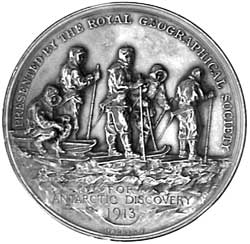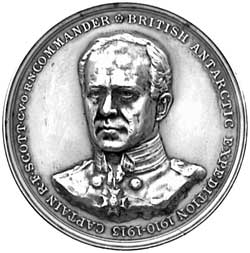British Groups


Lot 3767 British Groups
Estimate $15,000
Bid at live.noble.com.au
GROUP OF SIX:- China Medal 1900 - no bar; British War Medal 1914-18; Victory Medal; Polar Medal 1904, silver - 1 bar Antarctic 1910-13; Next of Kin plaque; Royal Geographical Society's Silver Medal for Scott's Antarctic Expedition 1910-13. MIDSN/LIEUT/CMDR H.L.L. Pennell HMS Goliath/Terra Nova/R.N. First four medals impressed the last unnamed. Very fine. Together with:- Diamond Jubilee 1897- large silver medal (55mm); Victory of Jutland Bank - large silver Medal (75 mm).
Harry Lewin Lee Pennell joined the Royal Navy as a Cadet Midshipman. He served in HMS Goliath as a Midshipman during the Third China War (Boxer Rebellion). After various postings he successfully completed the Advanced Navigation Course. In 1909 he was selected as Executive Officer in 'Terra Nova' the ship that transported Captain Robert Falcon Scott's second expedition to the Antarctic. On return from the Antarctic, Terra Nova sailed back to the United Kingdom where the expedition dispersed and Pennell returned to naval duties. 31 May 1916 found him serving in HMS Queen Mary at the fateful Battle of Jutland. Commander Pennell along with many members of the ship's company were killed in action on that day. SCOTT'S SECOND ANTARCTIC EXPEDITION On completion of Captain Robert Scott's successful expedition to the Antarctic in 1902-04 he pursued plans to lead a further expedition to consolidate and continue the progress he had made with the earlier project. However, Naval duties prevented him from furthering these aims until 1909, when he made a public appeal for finance. He announced plans to reach the South Pole and carry out exploration in the Ross Sea area and establish two bases for further exploration. Finally, the expedition, being made ready, departed London on 1 June 1910 in the Terra Nova, an ex-Scottish whaling ship. Apart from the scientists who would accompany him Scott gathered a strong Naval contingent, among whom was Lieut Pennell RN, who apart from acting as second in command to Commander E.R.G.R. Evans RN, (who had assumed command of the Terra Nova), was also an expert navigator and entrusted with the magnetic work of the ship - being in charge of the current and magnetic logs. Pennell was in Evan's assessment of him 'an officer of more than ordinary scientific attainments and a distinguished navigator'. It was intended that upon establishing the Antarctic base, Pennell would assume command of the Terra Nova, with Commander Evans taking charge of one of the shore parties. Whilst the ship was at Melboune, en route to the Antarctic a telegram was received by Scott from Roald Amundsen the Norwegian Arctic Explorer, announcing the latter's plan to also attempt to reach the South Pole. Finally, after enduring rough seas and storms (during which ten tons of the deck cargo of coal was jettisoned) Cape Crozee was reached on 3 January 1911. Due to an off-shore swell they were unable to land so a base was established in McMurdo Sound at a point named Cape Evans by Pennell. By 12 January all stores and equipment had been landed and with the shore parties established on the ice, Pennell now assumed command of the Terra Nova, a position he would hold until being relieved by Commander Evans towards the conclusion of the expedition. Immediately, plans were set in motion for the great journey South. An advanced party of twelve men set out on 25 January 1911 to establish supply bases along the planned route to the Pole. As it was Scott's intention to establish two bases, Lieutenant Campbell was appointed to command the 'Northern Party', which set out in the Terra Nova for the Bay of Whales. On arrival Pennell discovered their rival Amundsen had established a base there. Returning to Cape Evans they informed the others of the situation and the Northern Party members then proceeded to Cape Adare which they reached on 18 February. On the return journey on 22 February a previously uncharted stretch of land was sighted. Pennell named it 'Oates Land', in honour of Captain Lawrence 'Titus' Oates, of the Sixth Inskilling Dragoons. The Northern party settled down for the winter and exploration ceased except for a number of short journeys during the period July to October. Eventually embarking once again in the Terra Nova on 6 January 1912 they landed two days later in Terra Nova Bay to undertake further exploration. Despite plans to rendezvous with Pennell in mid-February, severe climatic conditions prevented this and after much privation and suffering during the Polar winter, they eventually made their way back. Reaching Hut Point on 6 November 1912, they finally arrived at Cape Evans and safety. Additionally during the time in the Antarctic, two geological expeditions were undertaken. The first of these (the Western Party) left in the Terra Nova on 12 January 1911 and landed at Butter Point, fifteen days later. They returned in the ship to the Base Camp on 13 April 1911. The second party left Butter Point on 8 November 1911. Intending to be met by Pennell at Cape Roberts they waited until 5 February 1912 and then made their way back towards Butter Point. They were sighted by Pennell and picked up four days later off the Blue Glacier. During the intense activity in Terra Nova, Pennell's merit had not gone unnoticed by Scott, who wrote in his journal: 'Pennell is truly excellent in his present position - he's invariably cheerful, increasingly watchful and continuously ready for emergencies. I have come to possess implicit confidence in him'. With all these other activities and journeys being carried out, the end of winter meant that planning by the Southern Party for the trek to the South Pole could now begin in earnest, no doubt spurred on by the Norwegian Expedition's close proximity. It now became a matter of national pride and prestige to achieve the prize of the ultimate goal of Antarctic exploration. The Southern party's journey commenced on 3 November 1911, when Scott's team, accompanied by three support teams of four men each, left Hut Point. Travelling via supply camps they had established previously, by 4 January of the new year the first support team led by Commander Evans detached to return to the base camp. During this return journey Commander Evans nearly died from scurvy, being saved by Chief Petty Officer Lashly and Petty Officer Crean. These two sailors were awarded the Albert Medal for their valiant efforts. Scott, accompanied by Doctor Wilson, Captain Oates, Lieutenant Bowers and Petty Officers Evans and Wilson now with just 235 km to go, was within reach of his goal. On 17 January 1912, their worst fears were realised when reaching the South Pole they discovered Amundsen had reached there first. The now worsening weather, shortage of food and the burden of bitter disappointment, all contributed towards the tragic end of a famous epic. Petty Officer Evans died first, Oates walked out into the blizzard and finally with under 20 km to reach food and safety at One Ton Camp, the blizzard halted them and they made their final camp. Scott, Bowers and Wilson calmly met their end by writing letters to friends and relatives. Scott's last entry in his diary was dated 29 March 1912. At the Base Camp, by the end of winter 1912, fears were held by the leader, Surgeon E.L. Atkinson for the safety of both the Northern and South Pole Parties. A search party for the South Pole Party which left Hut Point on 30 October 1912 made their grim discovery of the tent and it's tragic inhabitants. Erecting a large cairn of stones over the remains, the search party departed and on their return to Hut Point learnt of the safe return of the Northern Party. Whilst history was being made in Antarctica, the build-up of pack ice and floes and the advent of winter made the surrounding seas dangerous for the Terra Nova. As previously arranged, Pennell left Cape Evans on 3 March 1912 with a number of the expedition members who were returning home. Among these was Commander Evans, who severely debilitated by his ordeal, travelled to England to convalesce. Arriving in New Zealand on 1 April 1912, they learnt of Amundsen's success. After a refit in Lyttleton, New Zealand, Pennell now undertook various hydrographic surveys in Terra Nova on behalf of the New Zealand government. In December 1912 Terra Nova eventually returned south laden with supplies and tasked with the evacuation of the remaining members of the expedition. Commander Evans, his health now restored, resumed command observing 'She was once under my command as her original Captain, Pennell very gracefully and unselfishly standing down to the position of second in command.' Whilst transitting south, various scientific experiments were carried out. These were at the request of Professor (later) Sir Edgeworth David of Sydney University. On arrival in McMurdo Sound operations were set afoot to evacuate the base. Stockpiles of stores for future expeditions were landed, scientific and geological specimens were taken onboard and all remaining personnel embarked and Terra Nova sailed North. Oamaru, a small east coast town of the South Island of New Zealand was reached early on 10 February 1913. Pennell was sent ashore with Commander Evans' dispatch of the expedition which announced to the world the tragic news of the death of Scott and his companions. The ship returned to Lyttleton Harbour on 12 February and after a period of refitting and re-storing left for the United Kingdom.
Estimate / sale price does not include buyer's premium (currently 22% including GST) which is added to hammer price. All bids are executed on the understanding that the Terms & Conditions of sale have been read and accepted. For information on grading and estimates please refer to the Buying at Auction advice.
Quick find
View a lot by number and sale.
Adjacent lots
Lot 3765
TRIO: Crimea Medal 1854 - no bar; China War Medal 1856 - one bar - ...
Estimate $600
Lot 3766
PAIR: Queen's South Africa Medal 1899 - five bars - Cape Colony; Johannesberg; Diamond Hill; ...
Estimate $150
Lot 3767 This lot
GROUP OF SIX:- China Medal 1900 - no bar; British War Medal 1914-18; Victory Medal; ...
Estimate $15,000
Lot 3768
TRIO: 1914 Star; British War Medal 1914-18; Victory Medal. 8884 Cpl.W.Walker Cameron Highlanders, also cap ...
Estimate $200
Lot 3769
TRIO: British War Medal 1914-18; Victory Medal; Meritorious Service Medal. A/Cpl F.A. Anderson, Labour Corps. ...
Estimate $150